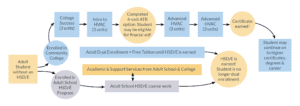Case Study: Ability to Benefit in California
November 8th, 2023 | Blogs
Representatives from Saddleback College presented on adult dual enrollment and Ability to Benefit at the California Dual Enrollment Equity Conference in May 2023.
By Laurencia Walker, Sherry Shojaei, and Shirley Doan
This blog post is the second in the The Ability to Benefit Provision: Expanding Access to College for Adult Learners series. World Education’s National College Transition Network (NCTN) provided technical assistance to the Career Ladders Project to expand usage of Ability to Benefit in California as part of the Advancing ATB for Equitable Access to Opportunity project. Read the preceding post, The Case for Ability to Benefit, to learn more about Ability to Benefit and Advancing ATB for Equitable Access to Opportunity, and visit the NCTN website for further guidance and resources.
With 1.8 million students enrolled,1 the California Community Colleges (CCC) system serves one-fourth of all community college students in the U.S.2 Forty-six percent of CCC students identify as Hispanic, 6 percent as African American, and 0.35 percent as Native American.3
The CCC system is lauded for multiple innovative practices, such as making all colleges open access institutions. Students do not need a certain grade point average (GPA), a specific score on an entrance exam, or even a high school diploma to be admitted. In addition, the CCC system now offers dual enrollment to both high school students and adult learners, further expanding access to postsecondary education. The CCC is also currently supporting the design and implementation of zero-textbook-cost programs to eliminate the costs of textbooks and materials for students, which currently average $938 per year.4 On the adult education front, California’s robust state funding for adult education (the California Adult Education Program) supports regional consortia of community colleges, adult schools, county offices of education, and community partners in implementing coordinated plans to better serve adult learners.
Despite these innovations, less than two percent of California adult education students enroll in a community college.5 Career Ladders Project (CLP), a nonprofit founded by the CCC Board of Governors in 2002, is currently working to support California adults without a high school diploma to earn their diploma while transitioning into college. The powerful combination of Ability to Benefit (ATB) and adult dual enrollment (under California Senate Bill 554) could ensure much needed financial support for these adult learners, including access to Pell Grants and free college tuition. However, both of these initiatives remain underutilized in the state: colleges and adult schools alike remain unaware of the availability of these programs and how to implement them.
To that end, this past year, CLP has revised and published its user guide on ATB and adult dual enrollment, Transitioning Adult Learners to College. In partnership with several California adult education partners, CLP hosted a statewide webinar on the user guide in February 2023. In workshops and presentations around the state, CLP highlights ATB as a key strategy in its technical assistance to community colleges – for example, in its work with the Orange County Regional Consortium on adult career pathways. The use of ATB in California was also recently featured in a CalMatters article, which was later picked up by KQED, bringing further attention to the opportunities ATB can provide.
 A slide from a CLP presentation showing how ATB and dual enrollment work together to serve adult students without a high school diploma or equivalent.
A slide from a CLP presentation showing how ATB and dual enrollment work together to serve adult students without a high school diploma or equivalent.
Over the next few years, CLP will continue sharing its user guide to build awareness of ATB in the field. To demonstrate the power of ATB and bring in more ATB champions, CLP also hopes to continue to spotlight the work Saddleback College is doing to scale up ATB usage for adult learners. Both of these steps will build momentum for a potential ATB state defined process in California, enabling even more adult learners to access postsecondary education.
Dr. Naomi Castro is the Chief Program Officer at Career Ladders Project. To learn more about ATB efforts in California, contact Dr. Castro at ncastro@careerladdersproject.org.
World Education fosters enduring partnerships across regions and sectors to advance education outcomes for all. We offer education systems strengthening, program design and implementation, applied research and evaluation, capacity development, and policy development services.